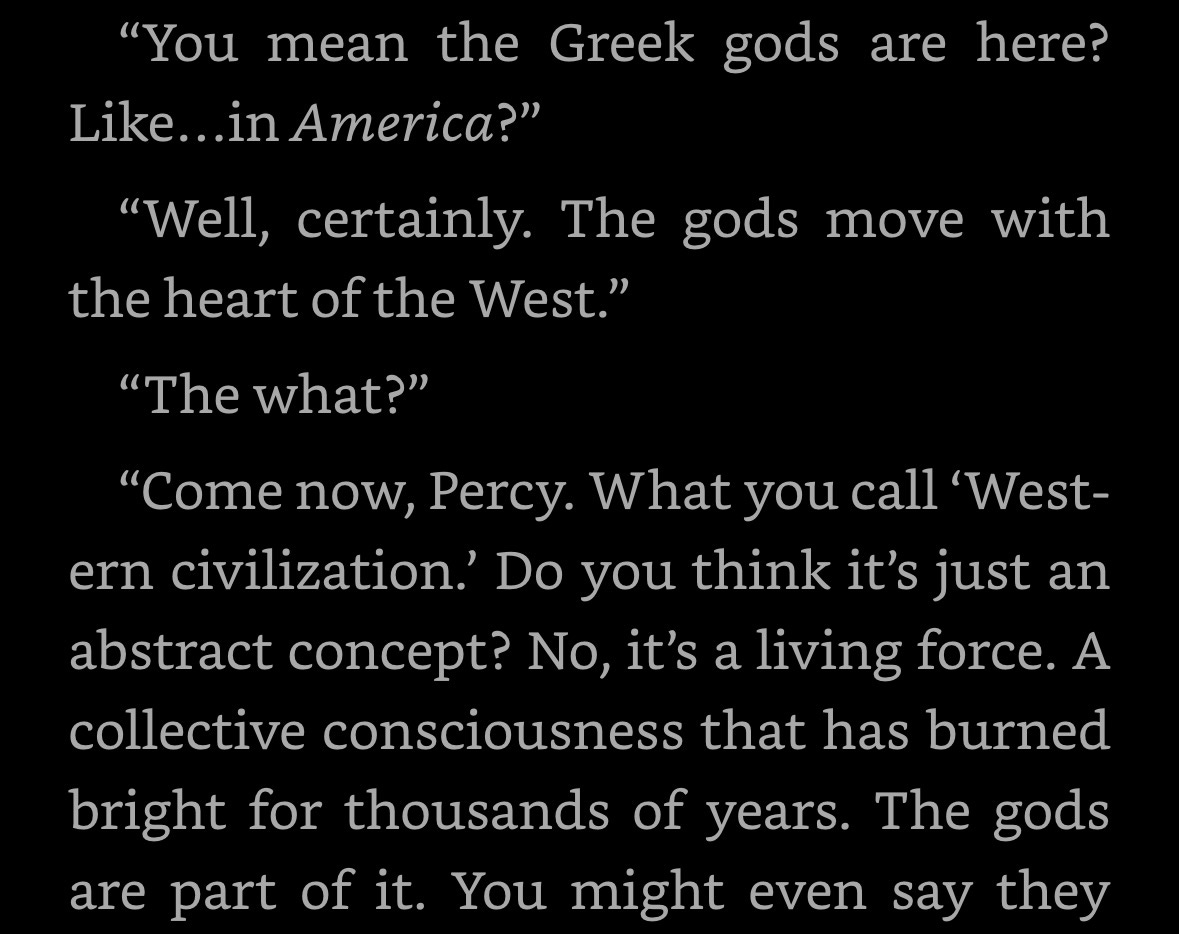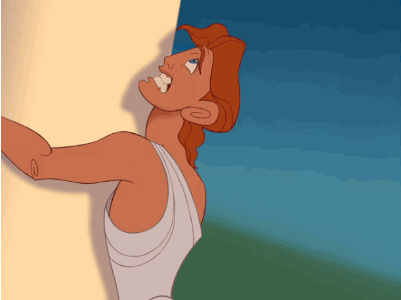
There’s a new Percy Jackson and the Olympians show out on Disney+, and, unsurprisingly, I have thoughts about it.
I mentioned in my welcome post that I’ve read ten Percy Jackson books. They’re… fine! Pretty good, even! The concept was clearly “Harry Potter but with Greek myth” – a trio of adolescent heroes (the chosen one, the brainy girl who does all the actual work, the goofball sidekick); a magical setting away from the real world where kids get educated on how to harness their powers; a lot of names taken straight from ancient Greece/Rome. Overall the plotting and characterization is less compelling than the Harry Potter books BUT the series’ writer, Rick Riordan, hasn’t taken a hard right turn into vocal transphobia, so that’s a huge mark in Percy Jackson’s favor. In fact, this guy has politics I can get behind:
(Sure, technically that last part is spoken by the series’ antagonist. But he’s an antagonist who makes some valid points. And even raising the idea that a “burn it all down” approach is the only way to deal with the concept of “Western civilization” is a pretty bold move. Rowling would never.)
Additionally, the demigods in the Percy Jackson series canonically all have ADHD and are dyslexic. The absolutely absurd reason given is that their brains are “wired to read ancient Greek” (note: to the best of my knowledge, people with dyslexia are not weirdly good at Greek) and that ADHD is actually useful for hyperfocusing in battle situations (…ok, that one is kind of plausible, maybe?). But leaving aside the reasoning, I’m completely in favor of stories with neurodivergent heroes. So far, the TV series hasn’t really addressed this element, instead labeling Percy as a “troubled kid” in the opening voiceover without delving into what that means from a neuropsychological perspective – although it does show the letters on his handout in the Met rearranging themselves when he looks at them, so that’s something. I’m hoping the ADHD aspect will come in later on.
When I started teaching myth, I knew a lot of my students’ first exposure to it would probably be from Percy Jackson, so I decided to educate myself. Like it or not, these books are part of the large tapestry of variants that comprise “Greek myth” now and a major funnel into the study of Classics. I mean, arguably what Euripides did with Homeric material isn’t so different from what Riordan is doing. Myth is an ever-growing body of stories. One of the many variants of Medusa’s story is that she had a garden gnome emporium off the New Jersey Turnpike, and that’s just where we are now. I don’t make the rules.
In addition to reading the first set of five books about Percy Jackson and his friends and a second set that includes Roman heroes too, I also saw the 2010 movie, which author Rick Riordan referred to in a 2020 tweet as “my life’s work going through a meat grinder”. Ouch! But I was cautiously optimistic for the new Disney+ series, which Riordan was closely involved with. That optimism blossomed when I heard that Jason Mantzoukas was cast as Mr. D/Dionysus, an absolutely inspired choice.
The first two episodes of the show came out last week, and I’m really enjoying it so far. It’s much more faithful to the books, which are episodic in a way that lends itself well to TV. The actors look like actual 12-year-olds instead of college kids. And the feel is right, which is arguably the most important thing of all. At its heart, getting myth right is about vibes. And the vibe of the new Percy Jackson feels good to me so far.
When I was reading the Percy Jackson books, I noticed there were a lot of elements of myth that Riordan really nailed. I’m not talking about the details of the stories, which aren’t even ultimately all that important. Vibes, remember? But there are big underlying themes the books touch on that I find both interesting and true to the spirit of myth.
As my major point of comparison for Percy Jackson here, I’m going to use Theseus, another son of Poseidon. (I suspect Riordan intended us to make this connection – Percy’s first major heroic deed is, you guessed it, slaying the Minotaur.)
Divine parent/step-parent relationships are messy as hell
The heroes of the Percy Jackson books are known as “demigods,” because one of their parents is a god. But while having a divine parent is a necessary condition for being a demigod, most of the time, those divine parents aren’t a huge part of their kids’ lives. The Olympians actually barely appear in Percy Jackson and the Olympians. Many of the kids at Camp Half-Blood don’t even know who their divine parent is and are sort of in limbo, hoping and waiting to be claimed.
That means that the heroes were raised by their human parents, often alongside another human step-parent. These relationships are more formative and defining for how the heroes interact with other people than their absentee, deadbeat divine parents. The show handles this aspect really well – Percy badly wants to be claimed by his divine parent, but as soon as he’s labeled “the son of Poseidon” as though that’s the only thing about him that matters, he immediately chafes at how a god he’s never even met suddenly defines him, and he asserts, “I’m the son of Sally Jackson.”
When there’s a step-parent in the picture, sometimes they really, really suck, like Percy’s mom’s partner Gabe. Dude is the absolute worst. Annabeth’s backstory also involves a stepmom who wasn’t super-psyched about having a monster magnet around. (More on that in a moment.) But in other cases the parental bond is genuinely warm, loving, and caring.
You see this kind of complex dynamic all the time in myth. The most famous example is probably Heracles, whose name means “the glory of Hera.” He’s also often referred to as “the son of Amphitryon” – except, of course, both Hera and Amphitryon are actually his step-parents, the spouses of his parents Zeus and Alcmene.
While Hera’s antagonism toward her hero stepson is legendary, Theseus got a better deal. Most of the stories about his human father Aegeus include how delighted he was to have Theseus as his heir. He loved his son so much that, when Theseus left to go to Crete to slay the Minotaur, he instructed Theseus that if he survived he should hang a white sail on his ship when he returned. But Theseus forgot to switch out the sails – as Catullus 64 points out, he was a pretty forgetful and inconsiderate guy. (Probably his canonical ADHD, am I right?!) When Aegeus saw the black-sailed ship approaching, he flung himself into what is now known as the Aegean Sea. Bummer. As my ex never fails to point out whenever this story comes up, this is why you should always make sure that your systems are set up to fail safe and not fail deadly.
There’s a messiness in the Percy Jackson books to all of these parental relationships that feels to me both true to the spirit of myth and to real life. Step-parent dynamics are tough! A few years ago I unexpectedly found myself with a bonus kid, and it’s been delightful and surprising and challenging in ways I never could have anticipated. This particular aspect of the Percy Jackson books is one of my favorite elements of its storytelling. Its nuanced approach to those parent-child dynamics encourages a different perspective on myth that really adds something.
Miracles as demigod DNA tests
If you’re a demigod who is lucky enough to be claimed by their divine parent, that claiming process usually involves your divine parent performing some kind of miracle. Percy explodes a toilet, and because that’s apparently too subtle, he later gets pushed into a river and a floating trident appears over his head.
My favorite example of this phenomenon is Bacchylides 17, a choral ode about the first meeting between Theseus and Minos, king of Crete and step-father of the Minotaur. (Why is the Minotaur called the Minotaur when its parents were Minos’s wife Pasiphae and a bull? Doesn’t it feel like kind of a weird fuck-you to Minos? See above re: complex stepdad dynamics!)
In Bacchylides 17, Theseus goes along with the young Athenian men and women who have been sent as sacrifices to the Minotaur. But when Minos gets a little handsy with one of the Athenian girls, Theseus tells him to back off – ritual sacrifice is one thing, but nonconsenual touching is a bridge too far. He tells Minos to watch it, and warns him that they’re equals – even though Minos is the son of Zeus, Theseus is the son of Poseidon.
The two heroes then prove their divine parentage with a spontaneous miracle-off. Minos calls down a thunderbolt from Zeus, then drops his ring into the sea and tells Theseus that if he’s really the son of Poseidon, he can go and get it. So Theseus swan-dives off the ship, and some dolphins bring him to his father’s palace, where Poseidon’s wife Amphitrite (stepmom alert!) decks him out in a fancy cloak and wreath, because it’s a classic stepmom move to prove that you’re one of the good ones by overcompensating via expensive clothes. Theseus then appears next to the boat, totally dry and wearing a snazzy new outfit. The Athenians all rejoice, even though, technically, Theseus didn’t actually do the thing Minos told him to do.
The entire episode, with its weird divine pissing contest, failures of continuity, and overall goofiness, could be slotted perfectly as a chapter into one of the Percy Jackson books. The vibe is an exact match.
Heroes are a menace to society
In The Lightning Thief, Annabeth tells Percy that she ran away from home because she was constantly being attacked by monsters, and her stepmom blamed her for constantly putting her younger half-brothers in danger. In a later book you find out that Annabeth was sort of projecting her guilt, and her stepmom is actually lovely and very fond and supportive. But even if she weren’t… she wouldn’t have been wrong to have some concerns, right? I love my bonus kid, but if she were semi-frequently attracting violent beasts to my house, I’d probably be a terrified and freaked-out mess! That kind of thing can really wreak havoc on a nervous system! I don’t know how I’d handle it – cry a lot? – but it wouldn’t bring out the best in me, I bet.
Throughout the books, the heroes’ adventures put normal people in danger. Usually those people are pretty clueless and any trauma is immediately wiped from their memories, which is convenient. But you certainly get the sense that, while the demigod kids are brought to Camp Half-Blood because it’s the only place where they can be safe from monsters, cordoning them off is also an overall boon for public safety.
The same principle definitely applies in ancient myth. Although heroes protect civilization from monsters and other threats, they also create a LOT of collateral damage.
Theseus has comparatively less collateral damage than Heracles, but he’s not the safest guy to be around. He spent a while stuck to a bench in the underworld, and that was probably a calm and peaceful time for all of Attica.
Those are the major themes I’m keeping my eye on for the remaining six episodes. In the meantime, if you’re watching the show and have thoughts/impressions, leave them in the comments!







